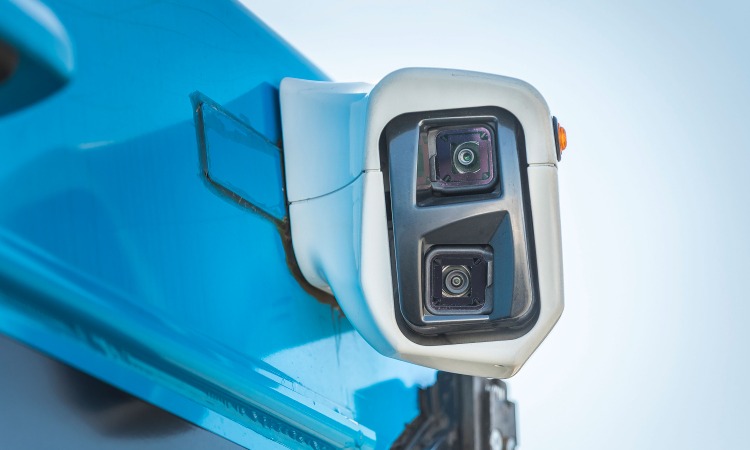

About us | Advertise with us | Contact us


By Pascal Octeau – Société de transport de Montréal
29 March 2022
Pascal Octeau, Section Manager – Projects and Tenders, Engineering at the Société de transport de Montréal, discusses the operator’s rear-view camera pilot as road testing trials continue, providing insight into the extensive work and testing that has facilitated the innovative project and highlighting the range of safety benefits that rear-view cameras, in place of rear-view mirrors, provide.
Credit: Société de transport de Montréal
The Société de transport de Montréal (STM), operating in the province of Quebec, is the second-largest transit provider in Canada. Boasting a 71km underground metro, a paratransit service and a bus network that covers over 500km2, with up to 1,400 buses in service during peak periods, STM provides transportation to hundreds of thousands of Montrealers every day.
Boasting a 71km underground metro, a paratransit service and a bus network that covers over 500km2, with up to 1,400 buses in service during peak periods, STM provides transportation to hundreds of thousands of Montrealers every day
Running a bus network in a city like Montréal comes with its fair share of challenges, including the harsh winter weather; variable road conditions; narrow streets requiring precisely calculated turns; a large number of kerbside lamp posts; traffic lights and signposts; and a high density of drivers, cyclists and pedestrians sharing the road and sidewalks.
Amid these conditions, rear-view side mirrors are vital tools for bus drivers. It is, therefore, no surprise that they have been the subject of an ongoing examination and improvement process led by the STM bus engineering team, in collaboration with several other sectors of the operations and maintenance departments. This process is what led to the current pilot project that is testing rear-view camera systems.
To download the article please login or create an account. If you choose to create an account you’ll gain access to our website content, as well as the opportunity to subscribe free-of-charge to Intelligent Transport magazine and its email communications.
Do you want to create an account?
Enter your email and password for Intelligent Transport below.
I’ve forgotten my password
Please enter your email and choose a password for your account. Passwords must be at least 8 characters long and contain at least one number, one uppercase letter, one lowercase letter, and one special character.
{{errors.email}}
{{errors.password}}
{{errors.confirm_password}}
{{errors.general}}
Please select whether you would like to receive Intelligent Transport’s magazine in printed and/or digital form, and choose which types of email communication you would like to receive.
Check all that apply:
Please enter your personal details.
– select – {{title}}
Please enter your location details. We may use these details to personalise the content you see.
– select country – Afghanistan Aland Islands Albania Algeria American Samoa Andorra Angola Anguilla Antarctica Antigua and Barbuda Argentina Armenia Aruba Asia/Pacific Region Australia Austria Azerbaijan Bahamas Bahrain Bangladesh Barbados Belarus Belgium Belize Benin Bermuda Bhutan Bolivia Bosnia and Herzegovina Botswana Bouvet Island Brazil British Indian Ocean Territory Brunei Darussalam Bulgaria Burkina Faso Burundi Cambodia Cameroon Canada Cape Verde Cayman Islands Central African Republic Chad Chile China Christmas Island Cocos (Keeling) Islands Colombia Comoros Congo Congo, The Democratic Republic of the Cook Islands Costa Rica Cote d’Ivoire Croatia Cuba Cyprus Czech Republic Denmark Djibouti Dominica Dominican Republic Ecuador Egypt El Salvador Equatorial Guinea Eritrea Estonia Ethiopia Europe Falkland Islands (Malvinas) Faroe Islands Fiji Finland France French Guiana French Polynesia French Southern Territories Gabon Gambia Georgia Germany Ghana Gibraltar Greece Greenland Grenada Guadeloupe Guam Guatemala Guernsey Guinea Guinea-Bissau Guyana Haiti Heard Island and McDonald Islands Holy See (Vatican City State) Honduras Hong Kong Hungary Iceland India Indonesia Iran, Islamic Republic of Iraq Ireland Isle of Man Israel Italy Jamaica Japan Jersey Jordan Kazakhstan Kenya Kiribati Korea, Democratic People’s Republic of Korea, Republic of Kuwait Kyrgyzstan Lao People’s Democratic Republic Latvia Lebanon Lesotho Liberia Libyan Arab Jamahiriya Liechtenstein Lithuania Luxembourg Macao Macedonia Madagascar Malawi Malaysia Maldives Mali Malta Marshall Islands Martinique Mauritania Mauritius Mayotte Mexico Micronesia, Federated States of Moldova, Republic of Monaco Mongolia Montenegro Montserrat Morocco Mozambique Myanmar Namibia Nauru Nepal Netherlands Netherlands Antilles New Caledonia New Zealand Nicaragua Niger Nigeria Niue Norfolk Island Northern Mariana Islands Norway Not selected Oman Pakistan Palau Palestinian Territory Panama Papua New Guinea Paraguay Peru Philippines Pitcairn Poland Portugal Puerto Rico Qatar Reunion Romania Russian Federation Rwanda Saint Helena Saint Kitts and Nevis Saint Lucia Saint Pierre and Miquelon Saint Vincent and the Grenadines Samoa San Marino Sao Tome and Principe Saudi Arabia Senegal Serbia Seychelles Sierra Leone Singapore Slovakia Slovenia Solomon Islands Somalia South Africa South Georgia and the South Sandwich Islands Spain Sri Lanka Sudan Suriname Svalbard and Jan Mayen Swaziland Sweden Switzerland Syrian Arab Republic Taiwan Tajikistan Tanzania, United Republic of Thailand Timor-Leste Togo Tokelau Tonga Trinidad and Tobago Tunisia Turkey Turkmenistan Turks and Caicos Islands Tuvalu Uganda Ukraine United Arab Emirates United Kingdom United States Minor Outlying Islands United States of America Uruguay Uzbekistan Vanuatu Venezuela Vietnam Virgin Islands, British Virgin Islands, U.S. Wallis and Futuna Western Sahara Yemen Zambia Zimbabwe
– select state – AA AE AK AL AP AR AZ CA CO CT DC DE FL GA GU HI IA ID IL IN KS KY LA MA MD ME MI MN MO MS MT NC ND NE NH NJ NM NV NY OH OK OR PA PR RI SC SD TN TX UT VA VI VT WA WI WV WY
– select state – AB BC MB NB NL NS NT NU ON PE QC SK YT
Please select your areas of interest. We may use these details to personalise the content you see.
Tick all that apply:
Please select which modes of transport you are interested in. We may use these details to personalise the content you see.
Tick all that apply:
– select country – Afghanistan Aland Islands Albania Algeria American Samoa Andorra Angola Anguilla Antarctica Antigua and Barbuda Argentina Armenia Aruba Asia/Pacific Region Australia Austria Azerbaijan Bahamas Bahrain Bangladesh Barbados Belarus Belgium Belize Benin Bermuda Bhutan Bolivia Bosnia and Herzegovina Botswana Bouvet Island Brazil British Indian Ocean Territory Brunei Darussalam Bulgaria Burkina Faso Burundi Cambodia Cameroon Canada Cape Verde Cayman Islands Central African Republic Chad Chile China Christmas Island Cocos (Keeling) Islands Colombia Comoros Congo Congo, The Democratic Republic of the Cook Islands Costa Rica Cote d’Ivoire Croatia Cuba Cyprus Czech Republic Denmark Djibouti Dominica Dominican Republic Ecuador Egypt El Salvador Equatorial Guinea Eritrea Estonia Ethiopia Europe Falkland Islands (Malvinas) Faroe Islands Fiji Finland France French Guiana French Polynesia French Southern Territories Gabon Gambia Georgia Germany Ghana Gibraltar Greece Greenland Grenada Guadeloupe Guam Guatemala Guernsey Guinea Guinea-Bissau Guyana Haiti Heard Island and McDonald Islands Holy See (Vatican City State) Honduras Hong Kong Hungary Iceland India Indonesia Iran, Islamic Republic of Iraq Ireland Isle of Man Israel Italy Jamaica Japan Jersey Jordan Kazakhstan Kenya Kiribati Korea, Democratic People’s Republic of Korea, Republic of Kuwait Kyrgyzstan Lao People’s Democratic Republic Latvia Lebanon Lesotho Liberia Libyan Arab Jamahiriya Liechtenstein Lithuania Luxembourg Macao Macedonia Madagascar Malawi Malaysia Maldives Mali Malta Marshall Islands Martinique Mauritania Mauritius Mayotte Mexico Micronesia, Federated States of Moldova, Republic of Monaco Mongolia Montenegro Montserrat Morocco Mozambique Myanmar Namibia Nauru Nepal Netherlands Netherlands Antilles New Caledonia New Zealand Nicaragua Niger Nigeria Niue Norfolk Island Northern Mariana Islands Norway Not selected Oman Pakistan Palau Palestinian Territory Panama Papua New Guinea Paraguay Peru Philippines Pitcairn Poland Portugal Puerto Rico Qatar Reunion Romania Russian Federation Rwanda Saint Helena Saint Kitts and Nevis Saint Lucia Saint Pierre and Miquelon Saint Vincent and the Grenadines Samoa San Marino Sao Tome and Principe Saudi Arabia Senegal Serbia Seychelles Sierra Leone Singapore Slovakia Slovenia Solomon Islands Somalia South Africa South Georgia and the South Sandwich Islands Spain Sri Lanka Sudan Suriname Svalbard and Jan Mayen Swaziland Sweden Switzerland Syrian Arab Republic Taiwan Tajikistan Tanzania, United Republic of Thailand Timor-Leste Togo Tokelau Tonga Trinidad and Tobago Tunisia Turkey Turkmenistan Turks and Caicos Islands Tuvalu Uganda Ukraine United Arab Emirates United Kingdom United States Minor Outlying Islands United States of America Uruguay Uzbekistan Vanuatu Venezuela Vietnam Virgin Islands, British Virgin Islands, U.S. Wallis and Futuna Western Sahara Yemen Zambia Zimbabwe
– select state – AA AE AK AL AP AR AZ CA CO CT DC DE FL GA GU HI IA ID IL IN KS KY LA MA MD ME MI MN MO MS MT NC ND NE NH NJ NM NV NY OH OK OR PA PR RI SC SD TN TX UT VA VI VT WA WI WV WY
– select state – AB BC MB NB NL NS NT NU ON PE QC SK YT
Please select which types of emails you would like to receive from Intelligent Transport:
Please review and accept Intelligent Transport’s privacy policy and terms & conditions
The main goal of this project is to facilitate safe driving and to improve overall safety for all road users in accordance with the City of Montréal’s participation in ‘Vision Zero’, which calls for zero deaths and serious injuries on the road, while also improving equipment durability and reliability.
The main goal of this project is to facilitate safe driving and to improve overall safety for all road users in accordance with the City of Montréal’s participation in ‘Vision Zero’
Despite adjustments to optimise placement and reduce size, side mirrors still require frequent replacement. Each year, STM replaces roughly 3,500 rear-view mirrors, causing buses to be stopped mid-service or towed to bus garages – impacting the quality of service for customers. While these replacements are indeed on the decline, side mirrors can still cause accidents involving pedestrians, a risk that is all but eliminated when the much more compact and higher-placed rear-view cameras are used. The cameras also greatly reduce the size of blind spots compared to regular side mirrors.
Wanting to bring our equipment in line with best practices from European and Asian countries, STM has begun testing rear-view camera systems under the real-world operating conditions of Montréal. This major project was realised through the combined and considerable efforts of many parties, including the departments of training, road safety and bus engineering, operations and maintenance, as well as the bus drivers’ union.
Credit: Société de transport de Montréal – Cameras are placed higher up and are more compact and durable, reducing potential damage from collisions with objects or pedestrians.
The project began before the pandemic with a process of testing, validating and fine-tuning the cameras under different operating conditions. Two buses were equipped with the systems, which include side cameras displaying images on dual screens inside the driver’s compartment. The screens are placed to the left and right of the windshield, allowing drivers to maintain their visual scanning habits at the wheel – making it easier to transition from buses with regular rear-view mirrors to ones with cameras. The system is easy to use and requires minimal training.
In this new phase of testing, STM aims to assess the system’s performance under different conditions to ensure the cameras’ durability and reliability, as well as to collect feedback on driver satisfaction and ease of use. The first tests were conducted by the engineering and road safety teams and by members of the drivers’ union. Their expert comments and recommendations were collected, shaping the project from the earliest stages to increase the chance of success of the next stages.
Because the two test buses are actually in service and being driven all day, the camera systems will be in use for many more hours, providing better long-term data on their durability and reliability. The systems are also subjected to real-world driving conditions for more in-depth testing. It is also important to consider how long drivers will take to familiarise themselves with the new system and how easily they will be able to switch between it and regular rear-view mirrors. For now, a two-hour training period is planned. Each driver testing out the system will also be asked to complete a survey, and the results will be compiled and included in the engineering team’s final report.
Rear-view cameras do provide the expected benefits, particularly in terms of improved visibility in various challenging lighting situations
Road tests with customers on board are progressing well since starting in early winter 2021, and the driver feedback received so far has been very positive. The results have been in line with what was observed in previous stages of the project – the rear-view cameras do provide the expected benefits, particularly in terms of improved visibility in various challenging lighting situations, such as tunnels, night driving, snow and glare from the sun. Drivers are also pleased with the improved field of vision and reduced blind spots during turns.
The cost of one pair of rear-view side mirrors is roughly $1,800, while a full rear-view camera system represents an investment of approximately $14,000. Although one cannot put a price on better road safety, this is a significant cost that must be taken into consideration. In the long term, however, the camera system’s durability and reliability, combined with the expected reduction in repairs or replacements due to accidents, must also factor into the equation.
Another expected benefit is the sustainability of the system. Every day, buses have to be taken out of service and returned to the garage because of rear-view mirrors that have broken in collisions. It stands to reason that replacing the mirrors with these more compact and sturdier cameras will keep buses on the road longer. STM also plans to assess whether long-term savings could potentially be achieved, given the system’s expected life span.
Credit: Société de transport de Montréal – Colour-coded lines were added as visual markers to help drivers gauge distance and perspective.
During initial testing without customers, STM teams made a number of improvements to the rear-view cameras and screens before putting the vehicles back into service. One problem that they encountered was that the heating element used to defog the camera lens did not hold up against built-up snow and ice while driving, nor did it prevent the appearance of dried water marks when the bus was washed. To remedy the situation, STM engineers designed a sophisticated device that keeps the camera lenses clean by using the pneumatic system, already present on all STM buses, to direct a jet of forced air into the camera lens. The device can be activated automatically or on demand, at the touch of a button on the driver’s dashboard.
STM collaborated with the system supplier to add visual markers to the screens… this makes it easier to gauge distances between objects or vehicles on the road
Test drivers also commented that it was difficult to accurately judge distances and perspective when looking at the screens, compared to side mirrors. In response, STM collaborated with the system supplier to add visual markers to the screens. Now, when the driver uses the turn signal or starts to back up, the following-coloured lines appear:
This makes it easier to gauge distances between objects or vehicles on the road.
In the interest of safety, the system also checks constantly to ensure that there is no delay in the image from camera to screen. In the event of a delay as short as a millisecond, the feed will cut and display an error message. This immediately alerts the driver, who can then pull over and perform the necessary troubleshooting. If the problem persists, then the standard repair or replacement procedure applies. In the medium- and long-term, a preventive and remedial maintenance schedule will have to be set if the cameras become more widely used in the STM bus fleet.
Rear-view camera systems are rarely used on public transit vehicles in North America, so it is important to consider all legal and regulatory factors before implementing them, even on a limited number of vehicles. Before beginning road tests, STM had to submit a report based on its initial closed-course testing to the Société de l’assurance automobile du Québec (SAAQ), the regulatory body for motor vehicles in Quebec, and be granted an exemption. This authorised STM to begin testing without customers and, once conclusive results had been obtained, to apply for another exemption to begin serving customers with the two buses.
Once the pilot project is over, STM will also submit a complete testing report to SAAQ. The report will be considered when SAAQ decides whether to authorise rear-view camera systems for vehicles currently in use. In November 2021, this type of system was authorised for certain Canadian city bus suppliers by Transport Canada, the federal institution that regulates new vehicles.
The rear-view camera pilot project is a promising endeavour that has brought together the innovative talents of multiple teams to solve real‑world problems
The rear-view camera pilot project is a promising endeavour that has brought together the innovative talents of multiple teams to solve real‑world problems directly relevant to the City of Montréal’s Vision Zero action plan. The test results and analysis will help STM to better evaluate the possibility of installing rear-view cameras on its current and future vehicles, while also ensuring that the company is properly prepared to do so.
With the bus electrification project well underway, this is another action that STM is taking to modernise its bus network and continue innovating to provide better, safer and more efficient service.
Pascal Octeau is a Unified Engineering graduate of the Université du Québec à Chicoutimi (’88) with more than 33 years of experience. For over 17 years, he has been the Manager of the Projects and Tender group of STM’s Bus Engineering division. His group is responsible for the research, development and monitoring of new ground transportation technologies, such as: specialised vehicles; electric and hybrid buses; and paratransit. Previously, for 12 years, he was a Research & Development Officer at CRIQ (Quebec Industrial Research Center) in the field of fatigue testing in land transport, advanced electronics and complex structures.
Write for us | Advertise with us
T: +44 (0)1959 563311
F: +44 (0)1959 563123
Intelligent Transport is published by:
Russell Publishing Ltd.
Court Lodge
Hogtrough Hill
Brasted, Kent, TN16 1NU
United Kingdom
© Russell Publishing Limited, 2010-2022. All rights reserved. Terms & Conditions | Privacy Policy | Cookie Policy
Website design and development by e-Motive Media Limited.
This website uses cookies to improve your experience while you navigate through the website. Out of these cookies, the cookies that are categorised as “Necessary” are stored on your browser as they are as essential for the working of basic functionalities of the website. For our other types of cookies “Advertising & Targeting”, “Analytics” and “Performance”, these help us analyse and understand how you use this website. These cookies will be stored in your browser only with your consent. You also have the option to opt-out of these different types of cookies. But opting out of some of these cookies may have an effect on your browsing experience. You can adjust the available sliders to ‘Enabled’ or ‘Disabled’, then click ‘Save and Accept’. View our Cookie Policy page.
Necessary cookies are absolutely essential for the website to function properly. This category only includes cookies that ensures basic functionalities and security features of the website. These cookies do not store any personal information.
Performance cookies are includes cookies that deliver enhanced functionalities of the website, such as caching. These cookies do not store any personal information.
Analytics cookies collect information about your use of the content, and in combination with previously collected information, are used to measure, understand, and report on your usage of this website.
Advertising and targeting cookies help us provide our visitors with relevant ads and marketing campaigns.
Author Profile
Latest entries
 राशीफल2024.04.25Aaj Ka Rashifal: कर्क और कन्या राशि वालों को कार्यक्षेत्र में मिल सकती है तरक्की, पढ़ें दैनिक राशिफल – अमर उजाला
राशीफल2024.04.25Aaj Ka Rashifal: कर्क और कन्या राशि वालों को कार्यक्षेत्र में मिल सकती है तरक्की, पढ़ें दैनिक राशिफल – अमर उजाला लाइफस्टाइल2024.04.25Winter & Migraine: इस मौसम में ट्रिगर हो सकती है माइग्रेन की समस्या, जानिए इसके कारण और बचाव के उपाय – अमर उजाला
लाइफस्टाइल2024.04.25Winter & Migraine: इस मौसम में ट्रिगर हो सकती है माइग्रेन की समस्या, जानिए इसके कारण और बचाव के उपाय – अमर उजाला धर्म2024.04.25'राजनीति का धर्म ' या 'धर्म की राजनीति' | Relation Between Politics and Religion – Hindi Oneindia – Oneindia Hindi
धर्म2024.04.25'राजनीति का धर्म ' या 'धर्म की राजनीति' | Relation Between Politics and Religion – Hindi Oneindia – Oneindia Hindi टेक2024.04.2522 New Technology Trends for 2024: New Tech Horizons – Simplilearn
टेक2024.04.2522 New Technology Trends for 2024: New Tech Horizons – Simplilearn











